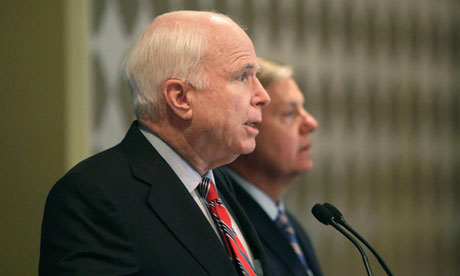Egypt's ousting of Mohamed Morsi was a coup, says John McCain
US senator's choice of words to describe army's overthrow of president may have legal ramifications for US aid to Egypt
Martin Chulov in Cairo
The Guardian, Tuesday 6 August 2013 19.09 BST

US senators John McCain and Lindsey Graham address a news conference in Cairo on 6 August 2013. Photograph: Asmaa Waguih/Reuters
Senator John McCain has become the first US official to describe the ousting of former Egyptian president Mohammed Morsi as a coup – a move that contradicts the White House stance and potentially raises legal ramifications for ongoing American aid.
Officials, including President Barack Obama, have avoided using the term to characterise the armed overthrow of Morsi's government on 3 July, largely because US law would then require it to cut aid with Egypt.
Since 1979, successive regimes in Cairo have been beneficiaries of US military aid in kind, which works as a gift voucher to select hardware such as fighter jets and ammunition. The aid deal started after former president Anwar Sadat signed a peace treaty with Israel, a treaty that remains a cornerstone of US foreign policy in the Middle East.
"We have said we share the democratic aspirations and criticism of the Morsi government that led millions of Egyptians into the streets," said McCain at the end of a brief visit to Cairo in which he and Democrat senator Lindsey Graham met senior officials. "We've also said that the circumstances of [Morsi's] removal was a coup. This was a transition of power not by the ballot box."
The bipartisan visit was aimed at rebooting ties between Washington and Cairo's new leaders and also to press for reconciliation between the interim military-led government and the vanquished Muslim Brotherhood movement, which remains encamped in two parts of the capital demanding that Morsi be reinstated.
The standoff is into its sixth week and a succession of envoys from the EU, African Union and US have done little to shift the seemingly implacable divide between the two sides, which has twice spilled over into deadly violence and continues to destabilise the country.
McCain and Lindsey arrived in Cairo one day after the deputy secretary of state, underscoring the concern Washington has over the situation in Cairo. Egypt's military chief, Abdel Fatah al-Sisi, has struck a vehement nationalistic posture since ending Morsi's term one year after he was democratically elected. However, Sisi said this week he continues to hold discussions with foreign officials, including the US defence secretary, Chuck Hagel, with whom he speaks daily.
"What happens in Egypt in the coming weeks is very, very critical and will have a decisive impact on this country and in the Middle East as well," McCain said.
Both senators pressed Sisi to release political prisoners, including Morsi, who has been held at a military base several hours outside of Cairo since 3 July. Morsi is being held with two aides, but is understood to have had no visits from his family. He has access to two daily newspapers and two television stations.
A number of Brotherhood leaders, including Morsi, face criminal charges. The allegations have infuriated Brotherhood backers who say they will remain on the country's deeply polarised streets until Morsi is reinstated.
Egypt's military is understood to be readying for an operation to clear both protest sites as soon as this Sunday, when the three-day Islamic festival of Eid al-Fitr finishes. Sisi and his senior officers have twice this week warned the Brotherhood they must leave the camps.
No comments:
Post a Comment